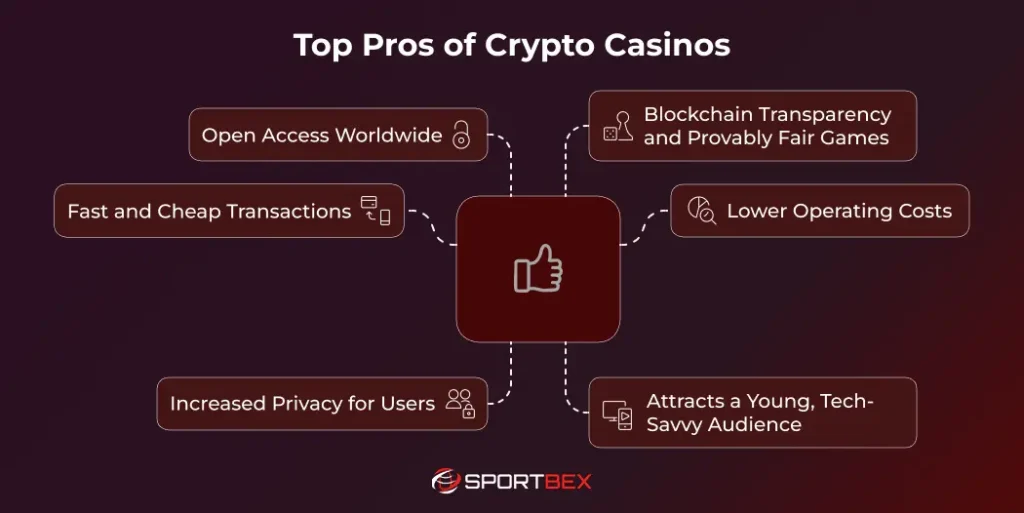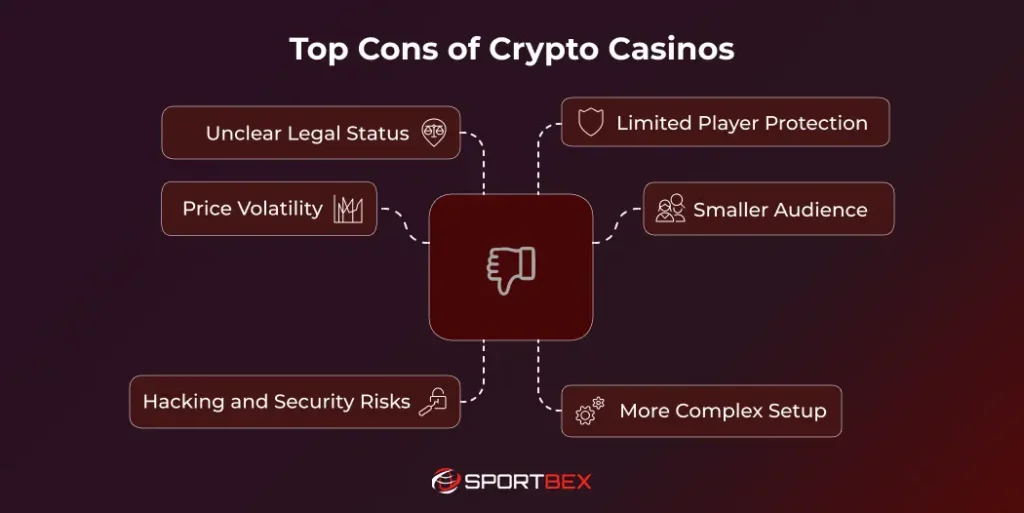Crypto casinos are revolutionizing the way players use the internet to enjoy their casino games.
The use of digital currencies is becoming increasingly popular, and players are becoming accustomed to crypto-based methodologies, as they offer quicker transactions, greater privacy, and attractive rewards.
Crypto casinos offer a modern way of approaching casino games compared to a traditional casino.
But is a crypto casino always a good idea?
Whether you’re a player trying something new or a developer thinking about building your crypto casino using a casino API, it’s important to look at both the good and the bad.
In this blog, we’ll summarize the pros and cons of crypto casinos to help you figure out if crypto casinos are right for you.
What is a Crypto Casino?—Overview
A crypto casino is an online gaming site that accepts cryptocurrencies like Bitcoin, Ethereum, or Litecoin as currency rather than traditional money. They typically offer many of the same games as online casinos, such as slots, poker, roulette, and sports betting.
The main distinction is how you pay and receive your winnings. Instead of using a credit card or bank transfer, you make deposits and withdrawals with digital currencies. This often means faster payments, lower fees, and more privacy.
Some crypto casinos are fully built on blockchain technology, which helps ensure fair gameplay and automatic payouts using smart contracts. Others are more traditional but allow crypto as a payment option.
Overall, crypto casinos offer a fast, private, and modern way to enjoy online gambling, making them a popular choice for players around the world.
Top Pros of Crypto Casinos

So, let’s take a look at the major pros of crypto casinos. These benefits make crypto casinos attractive for both players and operators/investors in the online gambling sector.
Open Access Worldwide
One of the great advantages of crypto casinos is that they can be accessed from anywhere in the world.
Because cryptocurrencies are decentralized and borderless, users don’t have the banking restrictions and country-specific payment problems that traditional banking usually imposes.
This can make it easier to reach players in geographic areas where traditional payment options are sparse, nonexistent, or blocked.
Fast and Cheap Transactions
Traditional casinos often take days to process withdrawals and charge high fees for transactions. Crypto casinos allow you to deposit and withdraw money in just a few minutes, usually with minimal or no transaction fees.
For example, if you’re using Bitcoin, your winnings might reach your wallet in under an hour. That’s a huge improvement over waiting several business days for a bank transfer.
Increased Privacy for Users
Many people are drawn to online crypto casino platforms because they can play without revealing their identity. In some cases, you only need an email and a crypto wallet to start playing.
This level of privacy is not possible with traditional casinos that require personal documents and ID verification.
This doesn’t mean the casinos are shady—it’s just that they’re built to give players more control over their data.
Blockchain Transparency and Provably Fair Games
One of the best innovations in crypto casinos is the use of “provably fair” games. These use cryptographic algorithms to prove that every roll of the dice or shuffle of the cards was fair and random. Players can check this themselves using public data.
That builds trust and helps casinos stand out from competitors who can’t offer the same transparency.
Lower Operating Costs
Operators benefit too. Because there are no credit card fees, no bank delays, and fewer third-party providers, crypto casinos can reduce their operating costs. This allows them to offer better bonuses, more promotions, or higher payouts to players.
Lower costs also make it easier for new businesses to enter the market using tools like casino API platforms to integrate games and features quickly.
Attracts a Young, Tech-Savvy Audience
Crypto casinos are especially popular with younger users who are familiar with blockchain, digital wallets, and NFTs. These users are often more open to new ideas and more likely to try out platforms that feel innovative.
This means crypto casinos can tap into a growing market of digital-first users who want more control and flexibility.
Top Cons of Crypto Casinos

While there are many benefits, it’s just as important to understand the cons of crypto casino models. Here are some of the challenges and risks.
Unclear Legal Status
The biggest issue for many crypto casinos is regulation. In some countries, it’s legal to use crypto for gambling as long as the casino has a license. In others, the rules are vague or constantly changing.
This creates a legal gray area:
- Players may unknowingly break local laws by using crypto casinos.
- Operators risk running an unlicensed business and facing fines or shutdowns.
Operators need to be careful and work with lawyers to stay compliant. If you’re thinking about entering this market, learn how to start a crypto casino the right way.
Price Volatility
Cryptocurrency values can change quickly. That means a player’s winnings might be worth a lot less (or more) the next day. This uncertainty makes it harder to manage your bankroll.
It also creates problems for operators, who have to decide whether to convert crypto into stable currencies or hold onto it. Either way, there’s financial risk involved.
Hacking and Security Risks
Crypto casinos need to take cybersecurity seriously. If a hacker gains access to a casino’s wallet, they can drain the funds, and there’s usually no way to get the money back.
Even big platforms have been hacked in the past. That’s why operators must invest in cold storage, multi-signature wallets, and frequent security audits.
Limited Player Protection
In most countries, licensed casinos must follow rules that protect players. But many crypto casinos operate under offshore or less strict jurisdictions. If something goes wrong—like a dispute over a payout—players may have little recourse.
Before joining any online crypto casino, it’s smart to check if they are licensed and what kind of support they offer.
Smaller Audience
Most people still prefer to use credit cards or bank transfers. While crypto is growing fast, it’s still a niche market within the gambling world.
That means crypto casinos might not attract as many players as traditional ones, at least not yet.
More Complex Setup
Running a crypto casino isn’t easy. You need to integrate wallets, manage blockchain confirmations, and possibly work with smart contracts. It’s not impossible, but it takes technical skills and a good development team.
That’s why many new platforms use ready-made solutions or work with partners offering tools like sports data API systems to build out features more efficiently.
Is Crypto Gambling Legal?
So, are crypto casinos legal? This is one of the most common and important questions people have when exploring the world of online crypto gambling. And the truth is, the answer is not black and white.
The legality of crypto casinos really depends on where you live, how your country regulates gambling, and whether it has laws around using digital currencies like Bitcoin or Ethereum.
Let’s break it down in a way that’s easy to follow.
1. Crypto Gambling Laws Are Different Everywhere
The rules for crypto gambling aren’t the same everywhere. Some countries have clear laws. Others are still figuring things out.
A few countries fully allow crypto casinos with licenses. Some have banned them completely. And many countries are somewhere in the middle, where it’s not clearly legal or illegal.
2. Countries Where Crypto Gambling Is Legal and Regulated
In places like the United Kingdom and some parts of Europe, crypto gambling is legal, but only if the casino has the right license.
For example, in the UK:
- Casinos must get approval from the UK Gambling Commission
- They must follow rules that stop money laundering and protect players
If a casino does everything by the book, it can safely accept cryptocurrency. This gives players more confidence that the site is fair and secure.
3. Countries Where Crypto Gambling Is Banned or Not Allowed
Some countries are very strict and don’t allow crypto gambling at all.
- China has banned both crypto and online gambling for a long time. Running a crypto casino is very risky and against the law.
- In the United States, online gambling laws are tough. Most states don’t allow crypto casinos, even if the casino is located in another country.
- In Australia, using crypto for online gambling was officially banned in 2024. This means it’s illegal for players and operators.
4. Countries with Unclear or Changing Rules
Some places, like Canada or certain countries in the European Union, don’t have clear rules. Crypto casinos might be working in a “grey area”—they’re not exactly legal, but not fully illegal either.
In these places:
- Laws can change quickly, which could cause problems for casino owners
- Players may not be fully protected if something goes wrong
5. Talk to a Legal Expert
Crypto gambling laws are new and can change quickly. What’s legal today might be banned tomorrow. That’s why it’s smart to talk to a lawyer who knows about both gambling and cryptocurrency.
They can help you:
- Stay safe and avoid getting fined or shut down
- Pick a country where crypto casinos are legal
- Get the right gambling license
- Follow rules about ID checks and money tracking (KYC/AML)
Should You Use Bitcoin for Online Gambling?
Many players ask: Is it a good idea to gamble with Bitcoin?
There are some benefits:
- Quick and cheap transactions
- More privacy
- Access to exclusive games and promotions
But there are also some downsides:
- Your winnings can lose value overnight if Bitcoin drops
- Mistakes (like sending funds to the wrong address) can’t be reversed
- It may be harder to get help if something goes wrong
If you’re familiar with crypto and comfortable managing your wallet, it can be a great option. If you’re new to digital currencies, start small and learn the basics first.
For operators, offering Bitcoin is a good way to attract crypto users and stay ahead of the curve. Just make sure your platform is secure and user-friendly.
Get a Ready-Made Platform On Rent.
Get Started Today
Conclusion
Based on the key pros and cons of crypto casinos discussed above, it should now be easier for you to decide whether a crypto casino is a better fit for your needs.
If you like anonymity, less wait time for payments, and low fees, a crypto casino may be suitable. But if you are worried about price volatility, the ambiguity or non-existence of regulations, or the reduced level of player protections, you may feel more comfortable at a traditional online casino.
Regardless of which route you choose, please play responsibly and only use trusted, well-reviewed platforms.
If you are building your platform, we recommend trying out the Sportbex API for quick, trusted, and real-time data from a casino.
Frequently Asked Questions
Generally, it’s safer to keep only a small balance on a casino account. For added security, use a personal crypto wallet (like a hardware wallet) to store your funds and only transfer what you need for playing.
Many crypto casinos allow players to register and play with minimal verification, especially for small deposits. However, some may require ID for larger withdrawals or to comply with regional regulations.
Yes, many crypto casinos offer welcome bonuses, free spins, and deposit matches.
Yes, but you’ll need a license, technical know-how, and a reliable platform. Our guide on how to start a crypto casino can help.
Absolutely. Most modern crypto casinos are mobile-friendly and optimized for both iOS and Android devices.
Recent Blog
White Label vs Custom Sportsbook: Which Is Right for You?
June 25, 2025
 8 min
8 min
Best 6 Cricket API Providers For ICC and T20 Matches
June 25, 2025
 7 min
7 min








